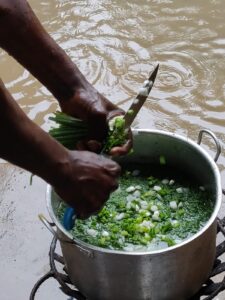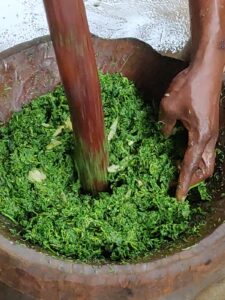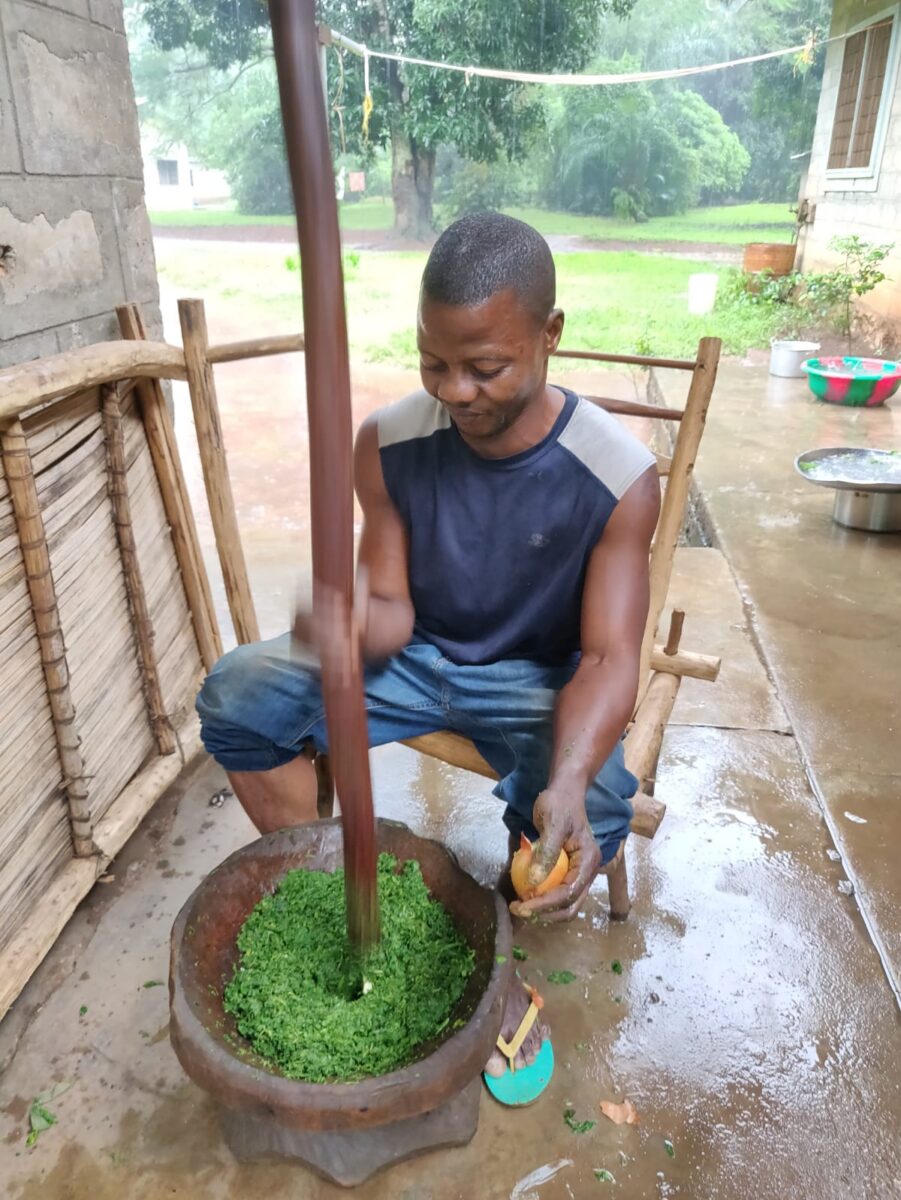 The rain starts as soon as our breakfast of peanuts and scrambled eggs is over although we’ve been feeling it coming for a while, with the sounds of thunder in the distance, the sudden suffocating humidity followed by the fluttering of curtains (made from old patient gowns from the nearby hospital) as the wind blows hard. Through the wood and wire mesh windows, I see the palm trees bending a bit, giving deference to the wind and we know that rain is coming.
The rain starts as soon as our breakfast of peanuts and scrambled eggs is over although we’ve been feeling it coming for a while, with the sounds of thunder in the distance, the sudden suffocating humidity followed by the fluttering of curtains (made from old patient gowns from the nearby hospital) as the wind blows hard. Through the wood and wire mesh windows, I see the palm trees bending a bit, giving deference to the wind and we know that rain is coming.
We drink something that looks like coffee but tastes nothing like it and I pray that it contains caffeine as I am exhausted thanks to large rats and some bats who kept me awake by scurrying in the ceiling right above me. All night I waited for the thud of a rat landing on my mosquito net because a ceiling tile is missing and I just know that a rat will careen towards me in his haste to do what rats do. The flutter of bat wings and their high pitched squeals grow louder when the rats are on the other side of the house and for a moment, I am almost pulled into sleep. I jolt awake as the rats return, running the length of the house and am amazed at the amount of noise these animals make in a building with a tin roof. Without a doubt, the rats win the noise making contest, even though the bats try their hardest. Exactly at 3am, a neighbor rooster joins the cacophony, followed by doves at 4am and all manner of frogs and other creatures. Sleep is sporadic and I have no doubt I look like death when I greet Mandaba, while he looks refreshed, having slept through it all. A cold bucket bath at 5am wakes me up long enough to chat for a while as we plan our day, to eat breakfast and to watch the skies open, dumping water in volumes I have never seen before. The downpour lasts until 1pm, creating flooded areas all around the guesthouse, with red mud flowing through the grass like so many snakes.
 Denase arrives soaking wet, leaning his bicycle against the guesthouse wall in order to join us on the veranda where we wait out the rain, in hopes of visiting beneficiary families. I give up after a couple of hours, as the sky is pewter grey and the thunder is not letting up. I take the best nap under the sound of African rains. Jetlag and a rat-infested night melt away and I wake up with a start to discover it is 11:20am. I join the guys on the veranda until I hear the unmistakable sound of the making of pondu, crushed cassava leaves. I follow the sound to the back of the house and meet a man sitting in the open under a small tin roof, with the largest mortar and pestle in motion. With one hand pushing the cassava leaves to the center of the bowl, he uses a 3.5 foot pestle to crush the leaves into mush, adding garlic and onion while continuing to pound. I use my few Lingala words to greet him, learn his name and to get permission to help cut and wash green onions, using the rain water which does not stop falling. The yard is flooded, as is the entire area behind the guesthouse where we are staying. I watch in fascination as palm oil, rich and orange is added to a pot, followed by salt and the pondu. All is placed in a small open fire, protected by the same time roof that protects us – him pounding and me leaning against the cement brick wall, watching. We cut the green onions and he adds them to the pot. I ask, “ekoki?” and he agrees, “ekoki” – it is finished.
Denase arrives soaking wet, leaning his bicycle against the guesthouse wall in order to join us on the veranda where we wait out the rain, in hopes of visiting beneficiary families. I give up after a couple of hours, as the sky is pewter grey and the thunder is not letting up. I take the best nap under the sound of African rains. Jetlag and a rat-infested night melt away and I wake up with a start to discover it is 11:20am. I join the guys on the veranda until I hear the unmistakable sound of the making of pondu, crushed cassava leaves. I follow the sound to the back of the house and meet a man sitting in the open under a small tin roof, with the largest mortar and pestle in motion. With one hand pushing the cassava leaves to the center of the bowl, he uses a 3.5 foot pestle to crush the leaves into mush, adding garlic and onion while continuing to pound. I use my few Lingala words to greet him, learn his name and to get permission to help cut and wash green onions, using the rain water which does not stop falling. The yard is flooded, as is the entire area behind the guesthouse where we are staying. I watch in fascination as palm oil, rich and orange is added to a pot, followed by salt and the pondu. All is placed in a small open fire, protected by the same time roof that protects us – him pounding and me leaning against the cement brick wall, watching. We cut the green onions and he adds them to the pot. I ask, “ekoki?” and he agrees, “ekoki” – it is finished.
Barefoot, I make my way back to the front of the guesthouse, joining the guys to watch the rain fall, fall, fall.


